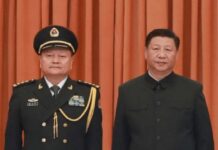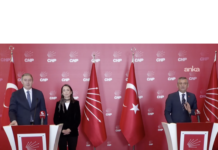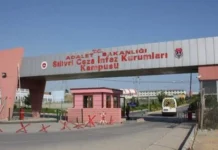Akın Özçer
The Turkish original of this article was published as ‘Bir hayalin sonu’ on 3rd July 2015.
Virtually as soon as the 7th June election results became public, the leader of the main opposition party began to claim that the ballot box had given birth to an anti-AKP majority, arguing that it was this bloc that should be forming the government. This, despite the fact that even though it had lost 9 points, the AKP was still the first party with more than 40 percent of the vote. Plus the fact that included in the said bloc were two parties such as the MHP and the HDP that were irreconcilably hostile to each other. Nevertheless, and although Devlet Bahçeli had declared on election night that he did not want to come together with the HDP, Kemal Kılıçdaroğlu behaved as if he had been asked the form the government when he went so far as to offer “the prime ministry” to the MHP leader, and was slapped with a very strongly worded reaction in return.
When you come to think of it, at the time there were so many pundits who were arguing along the same lines as Kılıçdaroğlu, that I found myself going from wonder to amazement at how the 7th June outcome could be read in this way. For in the light of these results, it really wasn’t possible to assert that there was bloc of voters who demanded that the AKP should be excluded from any government. It was only true that a part of the CHP’s electorate thought this way, and they even included some who had lent their votes to the HDP so that it could beat the [10 percent] threshold. But it was forcing the limits of logic too much to assume that the two other opposition parties’ and especially the MHP’s constituencies had voted for the purpose of creating an anti-AKP bloc which would then form the government.
I doubt if, in the aftermath of the previous day’s voting for the Speaker of the Assembly, those who persisted in this belief have realized the illusory nature of this bloc, for led by CHP spokesman Haluk Koç, they have been displaying an inordinate amount of anger at Mr Bahçeli. As an advocate of a New Constitution without any red lines as well as of continuing with the Solution Process, I am not one of those who favor a coalition with the MHP. Still, unlike some other commentators, I do not see the position adopted by the MHP Chairman in the Assembly Speaker elections as turning a green light on the AKP. My view is that Bahçeli was simply heeding the voice of his constituency in this regard.
I don’t have that many pro-MHP people around me, and cannot really claim to be able to assess their voters’ behavior, but on the basis of what I have heard from a number of people from the nationalist community who had voted for the AKP in the previous elections only to switch to the MHP for this one, the primary reason for this shift seems to be opposition not to the AKP as such but to the Solution Process. This much may be admitted for at least for the mutually transitive electoral subset shared by both parties, as further borne out by Tuğrul Türkeş stating that while they haven’t really been able to assess which one outweighed the other, this was clearly one of two major opinions manifested by their constituency.
Hence it should be regarded as entirely normal for the MHP, as indeed any other political party, to go by its own voters’ sensitivities in upholding a government without the HDP. Those who had shifted from the AKP to the MHP kept saying that they would feel betrayed if Bahçeli chose to join the opposition bloc, but that they did not really think he would do so. At the same time, they did not have any hard views on the choice of an Assembly Speaker. This must be why some thought it might be possible for the MHP to support Mr Baykal. In the end, though, once more it was advocates of an anti-AKP bloc who were disappointed.
Actually, it is not the MHP that should be criticized for what it did during the Assembly Speaker elections but the HDP. Certainly Deniz Baykal is a worthy statesman, and one might wish that the AKP and the CHP had reached a gentleman’s agreement to elect this veteran politician as Speaker of the National Assembly. I personally would not have opposed it, though I had strongly disapproved of especially his opposition to the Habur initiative. But as for a majority of HDP deputies voting for him despite the fact that they knew it was not going to have any impact on the outcome; should this be explained through the Stockholm Syndrome or an irrational kind of hostility to the AKP, I cannot really say.
To judge by HDP deputy Sırrı Süreyya Önder’s statements to CNNTürk, on the agenda for the next elections is creating a common roof for a single “democratic bloc.” In response to a question, Önder further said that he means “much more” than a CHP-MHP bloc. But a first simple point is that while he believes the CHP to be transforming itself, it is an open question, and a big question at that, whether or how much the CHP is ready to agree to making the new constitution without any red lines that is needed for solving the Kurdish question, or whether or how much it is ready to become a part of a peace process in line with what democratic countries have been able to achieve. Hence under the present circumstances, the bloc that he proposes is not only dubiously democratic but also very far from being realistic. Just like an exorbitated hostility to the AKP.
At the end of the day, what has to be emphasized yet again is that those who did not vote for the AKP on 7th November are very far from being united around the idea of a government being formed by this oppositional front. The Assembly Speaker balloting should have put an end to this illusion. Hence, too, it is wrong to read this balloting as the MHP turning on the green light for a coalition with the AKP. As Prime Minister Davutoğlu said after the Assembly Speaker had been elected, “as of today the notion of a bloc has collapsed altogether.” Hence the current parliamentary arithmetic remains incapable of entertaining the possibility of a non-AKP government. As for an AKP-MHP coalition, yesterday and today it is not actually in front of but behind the AKP-CHP alternative by at least one notch.












